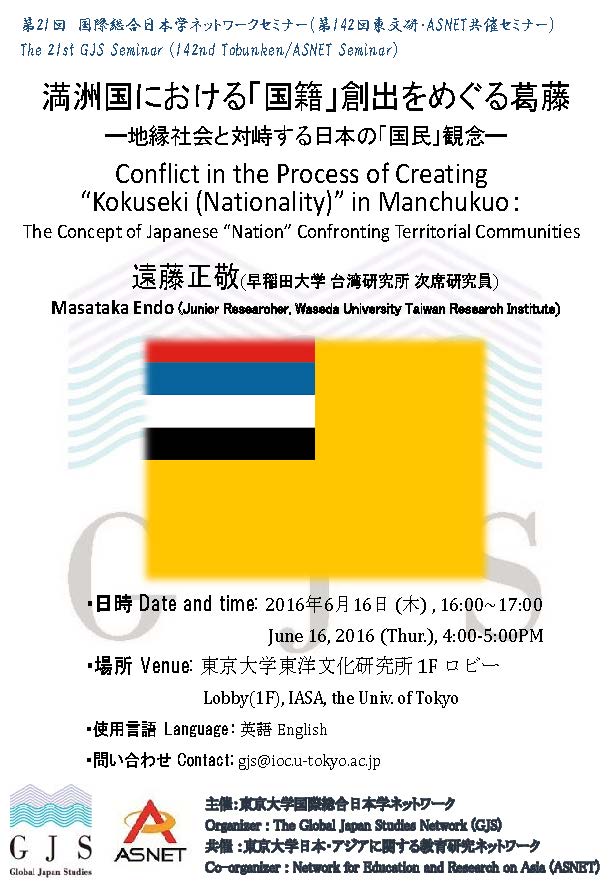以下の通り、第142回目のGJS主催、東文研・ASNET共催のセミナーを開催しました。
【日時 / Date】
通常と時間が異なります。
2016年6月16日(木) 16:00-17:00
June 16 (Thu), 4:00-5:00 p.m.
【会場 / Venue】
東京大学 東洋文化研究所 1階 ロビー
Ground Floor, Institute for Advanced Studies on Asia, The University of Tokyo
【報告者 / Speaker】
遠藤正敬 (早稲田大学 台湾研究所 次席研究員)
Masataka Endo (Junior Researcher, Waseda University Taiwan Research Institute)
【題名 / Title】
満洲国における「国籍」創出をめぐる葛藤--地縁社会と対峙する日本の「国民」観念
Conflict in the Process of Creating “Kokuseki (Nationality)” in Manchukuo: The Concept of Japanese “Nation” Confronting Territorial Communities
【要旨 / Abstract】
本報告では、満洲国統治における「国籍」の創出をめぐる政策過程を検討し、満洲国というトランスナショナルな空間のなかで浮かび上がった近代日本における「国民」観念の特質を明らかにしたい。
日本の帝国支配を貫いていたイデオロギーは、「万世一系」の天皇が「家長」として治める日本という「家」にすべての民族が「子」として包摂され、「皇化」するという家族国家思想であり、これが拡大されて「八紘一宇」の思想となった。そうした日本の「国体」の観念を支えるものが血縁の証明となる戸籍であった。
1932年に日本が樹立した満洲国では、建国理念として漢族、満洲族、モンゴル人、日本人、朝鮮人の「五族」、それに白系ロシア人などが平等な立場で建国に参加する「民族協和」が掲げられた。「単一民族」志向に立つ血縁社会国家を理想としてきた日本は、満洲国統治において人種、民族、宗教、家族慣習などの重層的な境界が交差する多元的社会に直面し、地縁社会に基づく国家建設が求められた。満洲国における国籍、そして戸籍をめぐる政策は、日本が未経験であった多民族・多文化共生国家を模索する試金石といえたが、それはいかなる帰趨をたどったのか。第一に、国籍法の立案における諸民族の国籍の扱いや、出生地主義と血統主義の対立について論じる。特に日本人の国籍は、「皇国臣民」の証しである戸籍と切り離せない問題であった。さらに、朝鮮人の国籍は、日本の朝鮮統治の根本にかかわる問題であった。第二に、満洲国の「国民」意識を醸成する目的から必要とされた国民登録法の問題について取り上げる。いずれも「民族協和」の理念との妥協と衝突を伴う争点であった。社会的亀裂を与件とする満洲国において地縁的「国民」を創出する上で、日本の「国民」観念はいかなる矛盾に行き当たったのか。
This report aims to clarify the concept of the nationality in Japan as a modern state , through examining the policy-making process regarding the legal construction of the nationality of “Manchukuo people” in Manchukuo as the transnational sphere.
The governance of Japan Empire had been penetrated by an unique family-state ideology, in which the State of Japan has been likened to “Ie(household)” ruled by an “unbroken line of Emperors” as the supreme “housekeeper”, and all nations entered it as “descendant” and assimilated. This ideology extended to the idea of “Hakko Ichiu” and had been exalted as “Kokutai (National polity)”which had been founded on the “Koseki” as the proof of the lineage tree of Japanese people.
The establishment of Manchukuo in 1932 appeared as a multiethnic state which Japan has never experienced. Manchukuo consisted of ethnically diverse populations such as Japanese, Han, Manchurian, Mongolian, Korean, what we call “Gozoku (Five Races)”, in addition White Russian and so on. Accordingly, the government of Manchukuo had to come up with the ideology of “inter-racial harmony (Minzoku Kyowa)’. In the process of governing Manchukuo, the government of Japan needed to build a state based on the territorial society, not the blood society based on the homogeneous ideology which had been dominant in Japan for a long time. Consequently, how to make the legal system of the nationality and the Koseki in Manchukuo was the touchstone of ability of Japan to construct the multi-national coexistence society in which “Japanese Subject” also took part with other nations equally.
First, I will discuss about the process of drafting Manchukuo nationality law and the problems such as the classification of ethnicity and the confrontation between Jus soil and jus sanguinis. Especially, I will focus on the treatment of the nationality of Japanese in Manchukuo. How to treat the nationality of Japanese had link with the Koseki as the proof of “Japanese Subject”. Furthermore, how to treat the nationality of Korean had affected fundamentally Japan’s coronial rule over Korea. Second, I will deal with the national registration law in Manchukuo, which was enacted for the purpose of fostering the national identity as “Manchukuo People” in the inhabitants. These issues could not avoid compromising with and clashing with the idea of Minzoku Kyowa. How did the concept of “nation” in Japan face the contradictions in the process of creating the “Kokuseki (Nationality)” in Manchukuo which had a severe social cleavage from the beginning?
※報告は英語で行われます。 Seminar will be held in English.
主催:東京大学国際総合日本学ネットワーク(GJS)
共催:東京大学日本・アジアに関する教育研究ネットワーク(ASNET)
問い合わせ:gjs[at]ioc.u-tokyo.ac.jp


